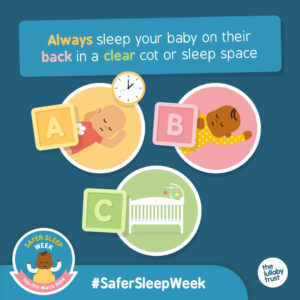On this page
Caring for a newborn baby
The below links on the NHS website explain useful information about how to look after a newborn baby in the first few days (0 to 12 weeks).
- Helping your baby to sleep
- How to change your baby’s nappy
- Nappy rash
- Reduce the risk of sudden infant death syndrome (SIDS)
- Soothing a crying baby
- Washing and bathing your baby
- What you’ll need for your baby
Safer sleep

You can significantly reduce the chance of Sudden infant death syndrome (SIDS) by following safer sleep advice.
This includes keeping the room temperature between 16 -20°C so your baby doesn’t get too warm, putting your baby on their back to sleep and keeping your baby’s cot clear of any items.
The Lullaby Trust website has more detailed information about keeping your baby safe when they are sleeping.
Crying
Babies cry, you can cope (ICON)
Crying can be upsetting and frustrating but it’s important to remember that a baby’s cry is designed to get your attention. Every baby is different, but after about 8 weeks, babies start to cry less and less each week.
ICON has been designed to help you cope and understand the normal crying pattern of your baby to keep them safe.
ICON has four simple messages to remember:
- I – Infant crying is normal
- C – Comforting methods can help
- O – It’s OK to walk away
- N – Never, ever shake a baby
If you are worried that your baby may be unwell, contact your GP or NHS 111. In an emergency, phone 999.
Bathing your baby
We recommend bathing your baby 2-3 times per week and delaying the first bath until they more than 24 hours old, when a newborn can more easily regulate their temperature.
Watch this step-by-step video for a guide on how to bath your newborn.
The bath time DUCK has been designed to remind you of the key messages about how to keep your baby or child safe:
- Do plan ahead
- Use touch supervision
- Check the water
- Keep your child safe
Car seats
Car seats are designed to keep babies safe while travelling, not as a main sleeping place. Car seats should only be used for transport and not as an alternative for cots or high chairs. It’s OK for your baby to fall asleep in a car seat when travelling, but they should be taken out as soon as you get to your destination, and placed onto a firm, flat surface to sleep.
How long should my baby travel in the car for?
If your trip involves driving for long periods of time, you should stop for frequent breaks. This will allow you to check on your baby, take them out of the car seat and let them stretch and move around.
For more advice, please read the fact sheet: Car seats – The Lullaby Trust
Worried about your newborn?
Are you worried about your new baby? If you think your newborn is unwell or you are unsure if their symptoms are normal, please phone 111 or your GP (doctor) for advice. In an emergency phone 999 or go to Children’s A&E at Leeds General Infirmary. Our MAC midwives cannot provide advice about the health of your baby once you have been discharged from hospital.
You can also find health advice about fevers, vomiting, bronchiolitis, breathing problems and other conditions in babies under 3 months at: Advice for parents of babies under 3 months. This website also explains the different symptoms to look out for and when to seek help. New baby – what’s normal and what’s not